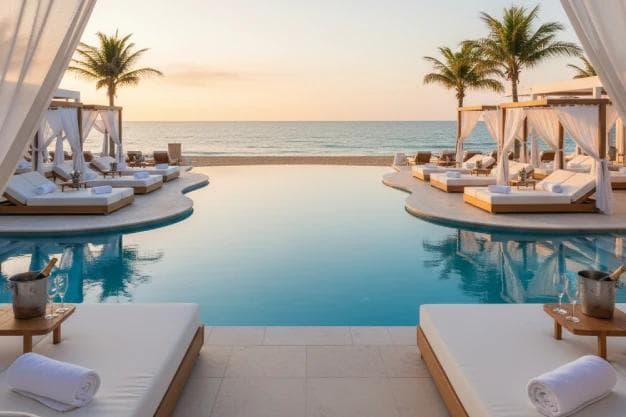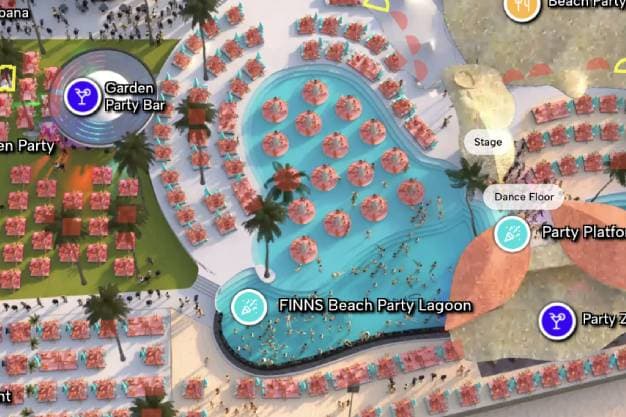The Hidden Revenue Leak in Your Beach Club Booking Flow
Published on: 10/24/2025

Why No-Shows Should Be a Red-Flag for Hospitality Execs
If you’re running a beach club, you already know the obvious costs: high rent near the sea, premium staffing, lavish set-ups, imported decor, and every “Instagram-worthy” moment choreographed for social viral impact. But what you might be underestimating is a stealthy revenue drain that most industry professionals don’t spotlight enough: the no-show.
Guests who reserve, don’t show — or cancel last-minute — cost you more than an empty seat. They cost you wasted labour, unused inventory, and missed upsells. Worse: they distort your forecasting, and erode your margins silently.
In this piece, we’ll unpack how no-shows hurt your bottom line, why a pre-payment/deposit system is a game-changer, and how platforms like Clubtech (that embed pre-booking payment) protect your revenue from that leak.
1. The Scale of the No-Show Problem in Hospitality
No-Shows by the Numbers
- A survey of UK restaurants found that on average one in five diners (≈ 20 %) fail to turn up for their reservation in major cities.
- That same survey estimated the annual cost to the UK restaurant industry at £16 billion due to no-shows.
- Another data point: 60 % of customers who cancelled did so with 24 hours or less notice; 19 % were no-shows (or same-day “just don’t show”).
- Businesses that introduced deposits reported a reduction in no-show rates of around 55%.
So What’s The Impact on Beach Clubs?
Beach clubs are a variation on the venue-based hospitality model: high overheads, a finite number of “seats” (sunbeds, daybeds, cabanas), and strong dependency on pre-booked spend or minimum spends.
When a guest books a premium furniture item (day-bed, cabana) and then doesn’t show, you’ve not only lost:
- The minimum spend you hoped to secure
- Potential upsell of add-ons (bottles, food, merch)
- The opportunity to resell that seat to someone else in the window
– but you also incur fixed cost: you’ve staffed for them, set up that furniture, reserved space, maybe imported bottles, etc.
According to a study on hotels, high no-show/cancellation rates degrade the effectiveness of revenue management because forecasting becomes less accurate.
In short: the formula you use for “expected revenue = bookings × average spend” breaks down when the bookings don’t convert to arrivals.
2. Why Booking Without Payment Leaves You Exposed
When you allow a reservation without securing payment or a financial guarantee, you are basically assuming the guest will show. You’re giving them the seat, your staffing, your environment — and hoping. That assumption carries risk:
- You cannot reliably re-sell the inventory if they don’t show, especially at peak times when immediate replenishment is unlikely.
- Your cost base (staff, furniture setup, beverages ordered) is already committed.
- Your marketing budget spent to attract the reservation still must be amortised.
- Your future pricing control suffers: since forecasting becomes flawed, you may under-price or over-allocate. (As shown in hotel research: “The higher the cancellation and no-show rates, the less effective the revenue management system is.”)
- Worst of all: your upsell funnel (bottles, VIP add-ons) fails to convert because you never get to the guest to upsell.
This is especially critical for venues like beach clubs or nightclubs, where minimum spends and furniture packages are common — the whole model is built around monetising each seat. A deserted cabana is not just empty: it’s a direct revenue sink.
3. Pre-Payment / Deposit Systems: Your Best Defence
Why They Work
- Financial commitment changes behaviour. When a guest pays (or commits to pay) before their arrival, they are less likely to cancel or just not show. The data backs this: one report found that deposits reduce no-show rates by ~55%.
- Guaranteed revenue. Whether they show up or not, at least the deposit is secured (or full payment). You’re no longer betting on the guest.
- Better forecasting. With payment secured, you have a clearer picture of which bookings are “firm” and can manage inventory accordingly.
- Upsell readiness. If you’ve taken payment, your guest is already committed and likely more receptive to add-ons.
- Operational optimisation. You know more reliably which slots will convert, so you can staff, order, and prepare accordingly, reducing waste and inefficiency.
How It Can Be Structured
For a beach-club booking model (like yours with Clubtech), you can implement:
- Deposit at booking: e.g., % of minimum spend or fixed amount when the user books the furniture package.
- Full prepaid model: guest pays entire minimum spend (or a close approximation) at booking time.
- Booking Insurance: define a cutoff (e.g., 48 hours before arrival) after which deposit can be refunded with the extra purchase of booking insurance, creating an extra revenue stream.
- Refund policy transparency: clearly communicate through the booking flow to avoid guest dissatisfaction.
Eat App’s analysis on the restaurant sector is instructive: they note that online payment at booking ensures you are paid for your time and that your client is committed at the time of booking.
Beach Club Specifics: Why It Fits Perfectly
- Furniture inventory is finite and high-value (daybeds, cabanas). Unused occupancy = high opportunity cost.
- Guests often upsell (bottle service, DJ packages) — you’re already feeding them a “modules” model, so locking the booking early is beneficial.
- Visual, social venues: the status of occupancy (via live map) matters — and if you’ve pre-paid guests, you avoid phantom furniture that skews your presentation and revenue.
- In holiday destinations (like Bali), guests may book multiple venues for safety — a deposit helps deter “just in case” behaviour.
4. How Clubtech Embeds the Solution
Here’s how the platform integrates pre-payment/deposit logic into a seamless booking flow — so you’re not nick-knocking the guest experience, you’re uplifting it.
Booking Flow Highlights
- At furniture-selection stage, the guest sees minimum spend and also knows: “Deposit required: X% or fully prepaid.”
- The “Add-ons” page remains intact: you’ve locked the seat; now the upsell begins.
- Cart review then payment: whether full payment or deposit, guest completes payment via secure embedded frame (supports international cards, Apple Pay/Google Pay).
- Confirmation: booking is guaranteed and visible in your dashboard — you don’t get phantom reservations.
Dashboard & Operations
- The FOH reservations dashboard shows live-seats booked/paid, reducing surprises.
- Promotional campaigns (e.g., “early-bird deposit waived if booking > 30 days out”) drive commitment while preserving marketing flexibility.
- API integration with POS/PMS ensures that the deposit/payment status synchronises across your systems — you know which seats are “locked with payment” vs just reserved.
Strategic Messaging You Can Use
For your marketing deck:
“With only 20% of diners honouring free bookings in city venues, as seen in UK research, beach clubs that don’t require payment upfront are silently bleeding revenue.”
“Venues that introduced deposits saw no-show reductions up to 55%.”
“Pre-payment isn’t about distrusting guests — it is about aligning commitments and elevating the service for those who show up.”
5. The Financial Upside — Realistic ROI You Can Communicate
Example Scenario
Let’s say your beach club has 100 premium furniture items available on peak days, each with a minimum spend of US$500. Assume the typical no-show rate without deposit is 15%. That’s 15*500 = US$7,500 of minimum spend at risk just in seat vacancy. Now add the upsell potential (bottles, extra spend) lost, plus wasted overhead.
When you introduce a deposit of say US$200 per booking:
- Your cash-flow improves (you’ve already collected US$200 × 100 = US$20,000 at booking time).
- If a no-show occurs, you might keep the deposit or apply a forfeiture policy — so part of the revenue is secured.
- Reduction in no-shows: if no-show rate drops from 15% to say 7% (conservative) → only 7 seats lost instead of 15 → you’re saving 8 seats * US$500 = US$4,000 in guaranteed minimum spend, plus upsell.
- Operational cost savings: fewer ghost guests = less wasted staff/amenities.
Multiply Across Your Peak Months
If you run 20 peak days per year (or more) with this model, you’re talking tens of thousands of dollars in saved revenue. You’re also gaining better data, better forecasting, and stronger guest behaviours (book with intent). The ROI on a booking-engine upgrade that supports this isn’t just incremental—it’s structural.
6. The Marketing & Guest-Experience Balanced View
One concern hospitality execs raise: “But will asking for a deposit reduce bookings?” Valid question. The data is encouraging:
- According to Eat App: the majority of consumers don’t balk at paying a deposit when booking online; modern guest expectations are evolving.
- A hospitality article on no‐shows noted that 33% of diners said they would be less likely to cancel if asked to pay a deposit.
- In other words: upfront payment filters less serious bookings and increases the ratio of committed guests — improving conversion quality, even if raw booking count declines slightly.
Given that your beach club model hinges on fewer high-value bookings (rather than high volume), that trade‐off often tilts heavily in favour of deposits.
From a guest-experience vantage: you can spin the deposit as an enhancement, not a hindrance:
- “Secure your elite seat with a small deposit, and arrive knowing your spot is locked in—no last-minute confusion or uncertainty.”
- Use the payment confirmation as a moment to upsell: “Thank you! Your deposit is secured. While you’re here, browse our VIP bottle upgrades…”
Thus, you preserve luxury positioning while reinforcing commitment. Win-win.
7. Final Word
No-shows are not just an annoyance—they’re a drain on your capital, your operations, your staffing and your forecasting. For a venue like yours, where every seat is a high-value asset, the cost of an empty cabana isn’t just the lost minimum spend—it’s the lost whole experience and upsell chain.
By incorporating a deposit or pre-payment model — executed via a purpose-built engine like Clubtech — you move from hopeful bookings to guaranteed committed bookings. You protect revenue, you improve guest quality, and you gain visibility into what’s really booked vs what’s just “on hold”.
Ready to plug the revenue leak of no-shows? Let us show you how Clubtech’s booking engine-with-prepayment logic can turn ghost seats into guaranteed spend.
👉 Contact us today to schedule a demo and see how your beach club’s bookings can convert better, upsell stronger, and operate smoother.


